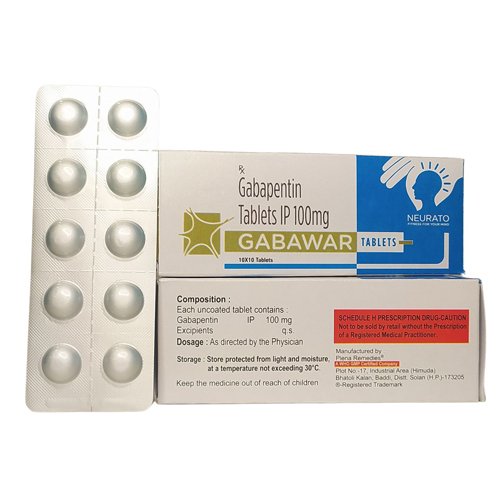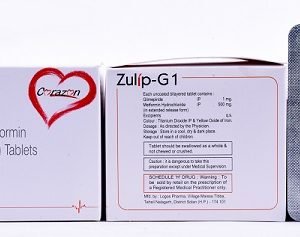Description
Gabapentin Tablets are used in the treatment of neuropathic pain and epilepsy. It belongs to the category of medicines called anticonvulsants also useful in the treatment of migraine headaches. Epilepsy is the disturbed nerve cell activity in the brain, causing seizures or periods of unusual behavior, sensations, and sometimes loss of consciousness. On the other hand, Neuropathic pain is a chronic progressive nerve disease that causes nerve pain. The medicine works by binding to the specific site on voltage-gated calcium channels which helps in relieving nerve pain and lowers the risk of seizures. It also reduces the number of pain signals sent out by damaged nerves in the body.
Do not self-medicate the medicine take it as per the dosage and duration prescribed by your healthcare professional. Do not crush, chew or break the tablets. It is advised to swallow the whole tablet with a glass of water, with or without food, or as advised by your doctor. Some people may observe side effects such as feeling sleepy, dizzy, or tired (fatigue). Inform your doctor if the side effects worsen or if you are allergic to similar medicines.
Medical benefits of Gabapentin Tablets
Gabapentin is primarily used to treat certain types of seizures (epilepsy) and nerve pain (neuropathic pain). It belongs to the category of medicines called anticonvulsants. Gabapentin is effective in controlling partial seizures and may be used alone or in combination with other antiepileptic drugs to manage epilepsy. The tablets work by binding to the specific site on voltage-gated calcium channels and blocking the action of overexcited channels. This helps in relieving nerve pain and lowers the risk of seizures. Some major medical benefits of Gabapentin Tablets are mentioned below:
- Reduce the intensity of Migraines
- Neuropathic pain following spinal cord injury
- Alcohol dependence treatment
- Neuropathic pain relief
- Helps in controlling the seizures
Side Effects of Gabapentin Tablets
There are mild to moderate side effects of Gabapentin tablets that get resolved over time. If your side effects persist or get worse with time, immediately inform your doctor. The side effects may vary for all users as they depend on the physiological condition and response to the treatment. The range of side effects that are noticed after using the Gabapentin tablets are mentioned below:
- Feeling sleepy
- Tired or dizzy
- Feeling sick (nausea)
- Being sick (vomiting)
- Diarrhea
- Getting more infections than usual
- Mood changes
- Swollen arms and legs
- Blurred vision
- Dry mouth
- Difficulties for men getting an erection
- Weight gain
- Feel hungry
- Memory problems
- Headaches
Drug Interaction
Gabapentin tablets may interact with certain medications when taken together. The drugs also have a tendency to interact with certain food items and health conditions. Do not take Gabapentin tablets with the following mentioned drugs.
- painkillers (morphine, hydrocodone, oxycodone, tramadol, codeine)
- antidepressants (fluoxetine, amitriptyline)
- antipsychotics (quetiapine)
- antimalarial (mefloquine)
- weight loss medicine (orlistat)
- anti-histamine (diphenhydramine, cetirizine)
Safety Precautions
1. Avoid consuming alcohol with the Gabapentin tablets as it may increase the adverse side effects such as sleepiness and dizziness.
2. Do not consume Gabapentin tablets without a doctor’s consultation if you are pregnant or breastfeeding your newborn.
3. Do not take Gabapentin tablets if you are suffering from any liver or kidney disorder.
4. Keep the Gabapentin tablets out of reach of children and pets. Properly dispose of expired and discarded medicines.
5. Store the tablets in a cool and dry place away from direct sunlight.









